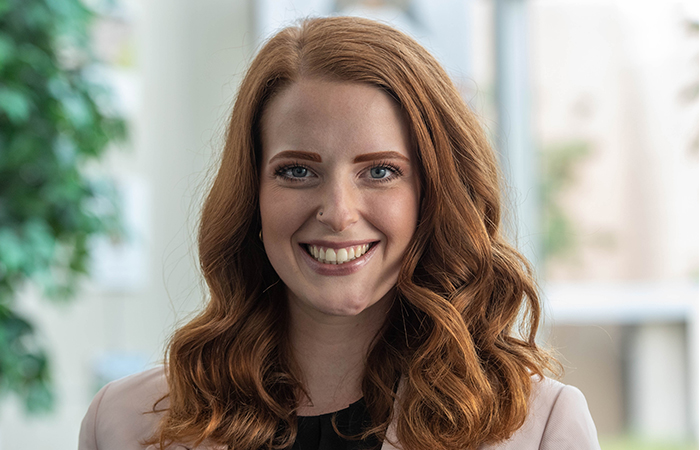Peyton Lindsay '22

Peyton Lindsay ‘22
Environmental Health
Why did you choose Texas A&M’s School of Public Health?
“My dad went to school here so I grew up always wanting to come to Texas A&M. I started out as a biology major but after talking with students who were in the School of Public Health about their classes, it sounded exactly like the path I had been looking for. Once I completed my bachelor’s degree in public health, I realized there is so much more to be learned, so I stayed at the school and joined the MPH program to be better prepared to enter the public health workforce.”
What has your experience been like in the program?
“I finished my bachelor’s right as the pandemic was starting, so completing my MPH has been a different experience than I’m sure others have had in the past. The pros to that have been my ability to talk more with professors because with online classes they could just set up a quick Zoom meeting. It’s been so rewarding and what I’ve learned helped me with everything I needed to do in my practicum. I’ve also received the base knowledge to do tasks outside of the program in organizations or my job.”
How do you feel this program has helped prepare you for a post-grad career?
“Although I don’t know exactly what I will be doing post-grad, I do feel a lot more prepared than before I joined the MPH program. With the mock interview processes and the resume workshops it’s hard not to feel prepared. I’ve gotten a real-world look at what public health looks like with my internship and have a greater understanding of workplace interaction and developing relationships.”
What level of support have you received while in your program?
“My dad passed away during my undergrad and I chose to withdraw from the university for a semester to be with my family. All of my professors up to that point personally reached out to me and offered their support. Dr. Jerry Carrino was one of the most supportive and kind in making sure I was okay. When I came back to A&M after a semester off, Dr. Carrino constantly checked in on me and made sure I was able to handle my workload. I really feel like the professors and advisors in the School of Public Health genuinely want to put in the work to help us do our best and they don’t mind if it takes extra time and effort on their end.”
What do you think of the coursework?
“To start, my core classes were hugely beneficial and helped kick-start the program. I’ve worked with my cohort and with different professors, and we bounce ideas off of each other with our different backgrounds and different undergraduate degrees. Because we are all different, I’ve gotten a more well-rounded idea of what we’re learning and the impacts it can have. I’ve also taken some sustainability courses so far that have helped me really narrow down what I want to do after graduation.”
How do you feel you have changed, personally or professionally, since beginning the program?
“It’s helped me become a more well-rounded team player. In undergrad we did group projects, but it usually just ended up with each of us doing our separate parts. In the master’s program, we do work that requires intense collaboration and feedback from each other, so I’ve been able to solidify my role in a group setting.”
What advice would you give to someone looking into A&M’s School of Public Health?
“Develop relationships with your peers and your professors. Not only will the people you develop relationships with support you during hard times, but they have also helped me get into contact with people about specific job positions that interest me. Having this support takes a lot of stress off your back because you don’t have to figure everything out on your own.”
What are your plans for the future?
My concentration in environmental health has really helped me in narrowing down what I want to do post-graduation. Although I have not accepted an official job offer, I certainly have a much better idea of the specific field I want to pursue a career in. I am planning on remaining on the environmental health and sustainability path and hope to put my knowledge and experience to good use in combating the rising environmental crises, especially regarding air and water quality.